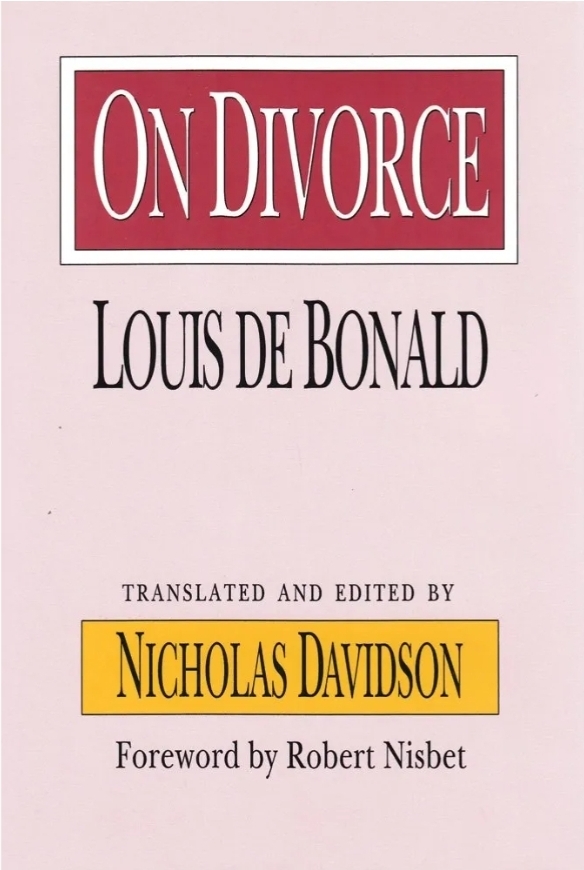Louis de Bonald’s On Divorce, Part of The Library of Conservative Thought, is a critical philosophical treatise that argues against the institution of divorce, reflecting Bonald’s deeply held conservative values and his defense of traditional family structures. Written in the early 19th century, this work represents one of the earliest and most forceful arguments against the idea of divorce, particularly as it was being introduced in post-revolutionary France.
Key Themes and Arguments:
Defense of the Family Structure:
- Bonald views the family as the fundamental unit of society, one that is not only essential for the upbringing of children but also for the moral and social stability of the entire state. He argues that the indissolubility of marriage is crucial for maintaining this structure.
- According to Bonald, divorce weakens the family by undermining the commitment that binds spouses together and disrupts the natural order of society. He believes that marriage is not just a contract between two individuals but a social and religious covenant with implications that extend to the community and the state.
Moral and Religious Foundations:
- As a devout Catholic and conservative thinker, Bonald’s opposition to divorce is heavily grounded in religious doctrine. He asserts that marriage, as a sacrament, is ordained by God, and therefore cannot be dissolved by human authority.
- The moral implications of divorce, in his view, are profound. Bonald argues that it encourages selfishness and moral decay, as it allows individuals to place their personal desires above their responsibilities to their spouse, children, and society at large.
Critique of Individualism:
- Bonald criticizes the rise of individualism, which he associates with the liberal and revolutionary ideas of his time. He believes that the introduction of divorce laws stems from the same individualistic philosophy that values personal freedom and autonomy over duty and obligation to the family and society.
- He argues that society should prioritize the common good over individual desires, and that allowing divorce weakens social cohesion by promoting the idea that personal satisfaction is more important than fulfilling social and familial obligations.
Social Consequences of Divorce:
- Bonald was deeply concerned with the social consequences of divorce. He believed that divorce would lead to the degradation of women, children, and society as a whole. Women, in particular, would suffer from the instability and insecurity that divorce brings, as it often left them without support in a male-dominated society.
- He also argues that children are the ultimate victims of divorce, as it disrupts their upbringing and places them in unstable environments. For Bonald, the family is meant to be a stable institution that nurtures and protects children, and divorce undermines this stability.
Divorce as a Symptom of Social Decay:
- Bonald views the legalization of divorce as a symptom of broader social decay. He believes that the breakdown of the family is a precursor to the breakdown of society. Divorce, in his eyes, is part of the larger revolutionary project that seeks to destroy traditional institutions and replace them with liberal, secular, and individualistic values.
- For Bonald, divorce is not just a personal matter but a political one, as it signals the erosion of the very foundations upon which a stable and moral society is built.
Marriage as a Contract vs. Covenant:
- A central point in Bonald’s argument is the distinction between marriage as a contract and as a covenant. He argues that the liberal conception of marriage as a contract, which can be dissolved by mutual consent (or even unilaterally), is fundamentally flawed.
- Instead, Bonald insists that marriage is a covenant, a permanent and sacred bond that cannot be broken. This view reflects his broader belief in the immutability of social and moral laws, which should not be subject to change based on personal whims or social trends.
Revolutionary Context and Critique of Modernity:
- Bonald’s work must be understood in the context of post-revolutionary France, where the secularization of laws and the rise of individual rights were taking hold. The introduction of divorce was part of this broader movement toward modernity and the rejection of traditional, religious-based social structures.
- Bonald’s opposition to divorce is part of his broader critique of modernity and the revolutionary changes sweeping Europe. He believes that these changes were leading society down a dangerous path toward moral relativism and social fragmentation.
Conservative Thought and Legacy:
- On Divorce is a seminal work in the conservative intellectual tradition, and it has influenced subsequent conservative thinkers who argue for the preservation of traditional family values and social stability. Bonald’s ideas resonate with later critics of divorce who emphasize the social and moral consequences of undermining the institution of marriage.
- His work also speaks to ongoing debates about the role of religion and morality in public life, and the tension between individual freedom and social responsibility.
Conclusion:
In On Divorce, Louis de Bonald presents a powerful and comprehensive argument against the legalization of divorce. Grounded in his conservative, religious, and social beliefs, Bonald sees marriage as a sacred, indissoluble covenant that forms the foundation of society. He views divorce as a symptom of broader social and moral decay, linked to the rise of individualism and revolutionary liberalism. The book remains an important work in conservative thought, emphasizing the importance of the family and the dangers of undermining traditional social structures.







